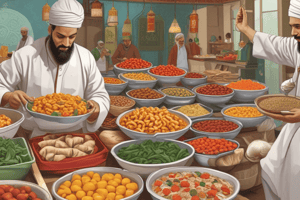Podcast
Questions and Answers
What is the full meaning of JAKIM?
What is the full meaning of JAKIM?
Department of Islamic Development Malaysia
What is the name of the organization that is responsible for the global Islamic economy's growth?
What is the name of the organization that is responsible for the global Islamic economy's growth?
- Islamic Organization for Food Security (correct)
- World Bank
- KOTRA
- Dinar Standard
According to the report, what is the estimated growth rate of the halal market in China?
According to the report, what is the estimated growth rate of the halal market in China?
- 15% per annum
- 10% per annum (correct)
- 20% per annum
- 5% per annum
The halal ecosystem is considered a dynamic system.
The halal ecosystem is considered a dynamic system.
What year was the first halal certification letter issued in Malaysia?
What year was the first halal certification letter issued in Malaysia?
What was the name of the document that discussed the Islamic economy's growth, development, and challenges across various sectors and regions?
What was the name of the document that discussed the Islamic economy's growth, development, and challenges across various sectors and regions?
According to the 2023 report, what was the estimated total value of Islamic finance-related deals?
According to the 2023 report, what was the estimated total value of Islamic finance-related deals?
Match the following organizations with their roles in the development of the halal ecosystem:
Match the following organizations with their roles in the development of the halal ecosystem:
What is the estimated total value of the Islamic economy sector in 2023?
What is the estimated total value of the Islamic economy sector in 2023?
What are the three key areas of focus that the MIPH, or Majlis Pembangunan Industri Halal, aims to enhance?
What are the three key areas of focus that the MIPH, or Majlis Pembangunan Industri Halal, aims to enhance?
What year did the NIMP 2030 document set forth Malaysia's future direction in industrial transformation?
What year did the NIMP 2030 document set forth Malaysia's future direction in industrial transformation?
What was the estimated GDP of Malaysia's halal industry in 2022?
What was the estimated GDP of Malaysia's halal industry in 2022?
Flashcards
JAKIM Halal Certification
JAKIM Halal Certification
A type of certification awarded by the Department of Islamic Development Malaysia (JAKIM), ensuring that products meet specific criteria regarding ingredients, production, and handling.
NIMP 2030
NIMP 2030
A comprehensive plan detailing the direction of industry transformation in Malaysia, setting out a strategic roadmap for industrial development from 2020 to 2030.
Growing Youthful Muslim Population
Growing Youthful Muslim Population
The growth of the Muslim population, exceeding two billion and representing over 25% of the global population, significantly contributes to the increasing demand for halal products and services.
Affluence of Muslim Consumers
Affluence of Muslim Consumers
Signup and view all the flashcards
Centrality of Islamic Values
Centrality of Islamic Values
Signup and view all the flashcards
Digital Connectivity and e-Commerce
Digital Connectivity and e-Commerce
Signup and view all the flashcards
Sustainable and Ethical Consumerism
Sustainable and Ethical Consumerism
Signup and view all the flashcards
Government Bodies as Enablers
Government Bodies as Enablers
Signup and view all the flashcards
National Islamic Economy Strategies
National Islamic Economy Strategies
Signup and view all the flashcards
Global Brand Involvement
Global Brand Involvement
Signup and view all the flashcards
Islamic Economy Investment Activity
Islamic Economy Investment Activity
Signup and view all the flashcards
Rise in Trade Agreements
Rise in Trade Agreements
Signup and view all the flashcards
Halal
Halal
Signup and view all the flashcards
Islamic Law (Sharia)
Islamic Law (Sharia)
Signup and view all the flashcards
Organization of Islamic Cooperation (OIC)
Organization of Islamic Cooperation (OIC)
Signup and view all the flashcards
Halal Industry Development Corporation (HIDC)
Halal Industry Development Corporation (HIDC)
Signup and view all the flashcards
Global Islamic Economy
Global Islamic Economy
Signup and view all the flashcards
Halal Food Complex in South Korea
Halal Food Complex in South Korea
Signup and view all the flashcards
State of the Global Islamic Economy Report
State of the Global Islamic Economy Report
Signup and view all the flashcards
Halal and Ethical Consumption
Halal and Ethical Consumption
Signup and view all the flashcards
Halal-Friendly Marketing
Halal-Friendly Marketing
Signup and view all the flashcards
Halal Certification Process
Halal Certification Process
Signup and view all the flashcards
Halal Standards
Halal Standards
Signup and view all the flashcards
Halal Certification Management
Halal Certification Management
Signup and view all the flashcards
Halal Industry Ecosystem
Halal Industry Ecosystem
Signup and view all the flashcards
Halal Technology
Halal Technology
Signup and view all the flashcards
Global Halal Promotion
Global Halal Promotion
Signup and view all the flashcards
Standardization of Halal Certification
Standardization of Halal Certification
Signup and view all the flashcards
Study Notes
Halal Market in Malaysia and Globally
- The halal business is a significant promoter of socioeconomic growth in Muslim-majority countries.
- Intensified efforts focus on improved halal governance and product supply chains.
- Increasing domestic demand for halal products exists in Muslim nations.
- Halal products offer added value and promote trade and investment.
- The importance of halal for Muslims is pivotal, driving a strong consumer base.
- A large gap exists between the demand and production of global halal products.
- Halal increases employment and safety standards for products.
Halal before JAKIM
- The Halal certification body, JAKIM, was established in 1997.
- Prior to 1997, Malaysia's Halal laws and regulations differed from current standards.
Halal in Malaysia
- Halal certification activities were consistently conducted by JAKIM.
- The Halal Industry Development Corporation (HIDC) was formed during the periods of 2006 to 2008.
- Halal certification letters, originating from the Research Centre of Islamic Affairs, were issued to products conforming to Halal criteria.
- Prime Minister's Department, under Islamic Affairs Division, established a committee responsible for Halal matters in 1982
- Halal certification evolved over time with changes in the form and scope of the certification given.
- A Halal logo or certification was made available.
Halal Ecosystem Definition
- The Halal ecosystem is a complex network of businesses, institutions, government agencies, and non-governmental organizations.
- It's a dynamic system functioning within a comprehensive network.
Halal Ecosystem
- The various components of the Halal ecosystem interrelate, developing a constant evolving relationship for sustainability.
- The various sectors of this ecosystem are linked and mutually dependent to a large degree, with each fulfilling different roles.
Global Halal Market Size
- Countries with an exceeding USD 100 billion market size contribute to the global halal market size.
- The market size ranges from USD 50 - 100 billion.
- Regions with a market size generally under USD 30 billion were also noted.
Emerging Halal Markets
- South East Asia has 230 million Muslims, with low per-capita trade of consumable food products.
- China's Muslim population is growing, driving demand for Halal foods.
- Europe has 50 million Muslims with high purchasing power.
- The Gulf Cooperation Council (GCC) regions have 40 million Muslim consumers, with high import demand.
State of the Global Islamic Economy Report 2023
- Muslim consumers spent an estimated USD 2.29 trillion in 2022.
- Islamic economy investments grew by 128% in 2021/22.
Defining the Islamic Economy
- “Halal” is an Arabic term meaning permissible.
- The Islamic economy encompasses sectors that align with Islamic ethics and laws.
- Halāl covers food, pharmaceuticals, cosmetics, finance, travel, media, and recreational activities.
Islamic Economy Growth Drivers
- The growing youthful Muslim population is a major driver of demand.
- Islamic values significantly influence lifestyle and consumption patterns.
- Digital connectivity and the rise of e-commerce.
- The intersection of Islamic values and sustainable, ethical consumerism affects numerous sectors of the Islamic economy.
National Islamic Economy Strategies
- The Islamic economy is gaining central importance for several non-Muslim majority countries.
- Governments and authorities worldwide support the promotion and growth of the industry.
Global Brand Involvement
- Several major players are contributing to the growing halal market.
- They provide innovative products and services related to the growing sector.
Islamic Economy Investment Activity
- Islamic finance is a catalyst for development of the halal ecosystem across various regions.
Rise in Trade Agreements and Intra-OIC Trade
- OIC members are forging trade agreements, increasing intra-OIC trade across different regions.
10 Years of Impact
- This section provides a summary of significant events and developments over the past decade.
- The data illustrates the growth and evolution of related initiatives and sectors.
Halal Industry Performance Indicators
- The halal industry displays significant growth and improved performance.
- Various metrics associated with performance, like GDP, productivity, exports, and employment indicate positive trends, with expected continued improvement through 2030.
How to promote halal industry in Malaysia?
- Recommendations for improving governance, certification, business, academia, consumer-centric approaches, and support for industry stakeholders.
Halal Market in Malaysia
- This section provides a brief overview of various sectors in the halal market.
- Product sectors in this market include food and drinks, pharmaceuticals, and consumer products.
Halal Industry Master Plan 2030
- The plan aims for global competitiveness and wellbeing.
- Its goals include advancing Malaysia's halal industry internationally, creating a robust and dynamic halal ecosystem, fostering Malaysia as a global leader in this sector, and creating equitable job opportunities and society.
Vision, Theme & Mission
- The vision and mission articulate the aims and aspirations for the future of the halal industry in Malaysia. Emphasizing on prominence, visibility, globalisation, and inclusive growth with a focus on sustainability.
Importance of Halal Industry
- A variety of aspects for the importance of the industry and sectors are highlighted, such as investments, exports, productivity, environmental awareness.
Malaysia's Halal Ecosystem
- The components involved in the Halal industry are categorized and presented in an interconnected manner, highlighting the dynamic nature of the system, and including various stakeholders such as consumers, industry players, and governmental bodies.
- Key enablers are also noted
NIMP 2030 Sectoral Plan
- The document provides a supplementary guide, with individual summaries highlighting elements of the main objectives, sectors, and other relevant data.
Studying That Suits You
Use AI to generate personalized quizzes and flashcards to suit your learning preferences.
Related Documents
Description
Explore the significance of the halal industry in Malaysia and its global relevance. Understand the role of JAKIM in halal certification and the socioeconomic impacts of halal products, including employment and safety standards. This quiz will highlight the challenges and opportunities within the halal market.




